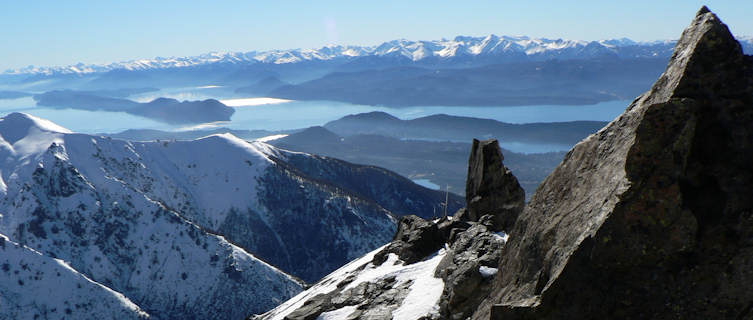
Catedral ski resort
Catedral is not only the largest ski area in South America but also one of the three largest resorts in the entire Southern Hemisphere in terms of both terrain and uplift – moving an incredible 35,000 winter sportsmen and women up the mountain every hour.
The ski area is long established, having become Argentina’s first when it opened in 1938. The resort’s history is a colourful one: one incident of note was the sinking of the ship transporting the resort’s first cable car, which was ordered from Italy just before WWII. A replacement was finally delivered five years after the war ended, and since then the ski area has gone from strength to strength.
Today Catedral offers a ski domain of world-class dimensions. The views from Catedral – or Gran Catedral (Grand Cathedral) as it is often dubbed – are regarded as among the best in the skiing world, with wonderful vistas across to the mountains above Lake Nahuel Huapi.
As with other Southern Hemisphere resorts, Catedral also capitalises on being operational at a time of year when the vast majority of the world’s other big name ski areas are closed for snow sports, adding yet another string to Catedral’s well-strung bow.
Catedral is located close to the Chilean border (which can be reached via the Puyehue Pass) in the province of Rio Negro, in Patagonia. The resort is 15km (9 miles) from the city of San Carlos de Bariloche and is set within the Nahuel Huapi National Park in the foothills of the Andes.
On the slopes
Catedral has a mixed reputation for its snow cover, as its location, amongst several lakes, and its modest base elevation can mean rain on lower slopes when it’s snowing at the summit. As a consequence, average snowfall figures for the base of the mountain are around a quarter of those 1,000m (3,230ft) above.
Catedral is popular with beginners, who make up the majority of its clientele; many of whom arrive from the mostly snowless nation of Brazil. Nursery areas can be found at the top of the slopes in case snow cover is an issue lower down. And, once able to move around the slopes, novices have more than half of the runs on the mountain to themselves; including the longest, a 9km (6-mile) descent.
Intermediate skiers are able to zip around the mountain and make best use of the wide, open bowls and plateaus that boast more than a dozen runs.
Expert skiers will also not be disappointed, as there are slopes pitching at up to 60 degrees and 10 groomed black runs. There are also several hike-to areas for free-riding and some good tree skiing on the lower half of the ski area.
The ski area also features a 3,000sqm (32,300sqft) terrain park with a range of jumps, an air bag and rail park suitable for all ability levels.
But it’s not all rosy. A current criticism is the lack of signage on the slopes (compared to big resorts of Europe and North American), so the advice is to familiarise yourself with the resort map before pulling on the skis.
Do you have any Feedback about this page?
© 2026 Columbus Travel Media Ltd. All rights reserved. No part of this site may be reproduced without our written permission, click here for information on Columbus Content Solutions.








 You know where
You know where